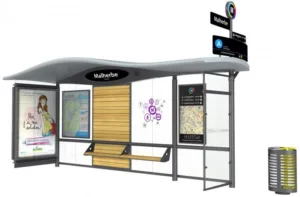JCDecaux SA (Euronext Paris: DEC), the number one outdoor advertising company worldwide, has won the 12-year bus shelter contract from the Grenoble urban area public transport authority, Syndicat Mixte des Transports en Commun – SMTC.
Financed by advertising, with no costs for the SMTC and the Grenoble urban area inhabitants, according to the business model invented by Jean-Claude Decaux in 1964, this new offer, which covers the supply, installation, operation and maintenance of a new generation of more than 1,100 bus shelters and user services, is part of a drive by the SMTC to boost the quality of life and everyday sustainable mobility, and anticipate the requirements of the future.
New Services To Enhance The Day-to-day Lives Of Residents
The new bus shelters will respect and enhance the strong identity of this area. With a customised, welcoming, modern design and easily recognisable signage, they will simplify the travel experience and display alternative transport options: car sharing and bike sharing services, and connections located nearby.
Users’ journeys will also be made easier with digital screens showing real-time information and interactive content.
With these new bus shelters, the SMTC aims to optimise users’ wait times, offering a large space dedicated to local communication and local cultural bodies, where they can try out entertainment, cultural and tourist services such as book kiosks, interactive libraries, or terminals distributing short stores to read during the journey.
With connectivity now a major factor underpinning appeal and accessibility of bus shelters, some street furniture will offer Wi-fi connection and all the bus shelters will be equipped with USB ports.
Sustainable Rebuilt And Eco-friendly Bus Shelters
In order to accompany the SMTC in its sustainable development policy, JCDecaux has proposed its most innovative solutions to help moderate the environmental impact of the street furniture, in particular by rebuilding them as new, in line with the principles of the circular economy. The seats and walls at the back of the bus shelters will be made from highly ecological larch wood from the Alps, which has received FSC or PEFC certification (sustainable management of forestry resources).
The new bus shelters will consume 68% less electricity than the previous shelters. LED lighting with modulation of light intensity will guarantee the best ratio of energy efficiency to lighting quality and 100% of electricity used will be through renewable sources.
The bus shelters will continue to be maintained using rain water and environmentally-friendly products.
Because eco-development goes hand-in-hand with social engagement, JCDecaux’s local team, based in Fontaine, will implement a proactive policy of workplace integration and will prioritise the long-term unemployed from the Grenoble area.
Highly-flexible And Shared Solutions That Look To The Future
SMTC’s ambition is to remain at the forefront of services to users of public transport; JCDecaux has responded to this by proposing bus shelters that are not only innovative and service-focused but also highly flexible, for instance incorporating low frequency antennae (small cells) to improve mobile network coverage and performance.
As part of an open innovation approach with start-ups and local associations, JCDecaux and the SMTC will be able to identify, test and deploy services and functionalities of the future, which will be of use to residents in terms of comfort, multimodal mobility, accessibility, air quality, promotion of sports and street art, and participative democracy. Among many other services, JCDecaux will work in partnership with the employment rehabilitation company EcoMégot from the social and solidarity economy to install a minimum of 22 ashtray supports, the cigarette ends from which will be collected and recycled for the benefit of two recovery and reutilisation channels.
Jean-Charles Decaux, Chairman of the Executive Board and Co-Chief Executive Officer of JCDecaux, said: “We are delighted to continue our partnership with the SMTC and to accompany it in its goal to continue innovating to improve everyday quality of life and transport. We have listened to its expectations and through it those of its users in order to propose an offering tailored to the specific requirements of the Grenoble urban area. Service, innovation, differentiation and customisation are the watchwords for these particularly innovative and inclusive shelters, which will provide information, connectivity, innovative services and cultural proposals to help make living together better.
Our teams believe that this services-oriented platform will be instrumental in ramping up sustainable mobility, and are ready to ensure the success of this unique project.”
KEY FIGURES
- 2018 revenue: €3,619m
- JCDecaux is listed on the Eurolist of Euronext Paris and is part of the Euronext 100 and Euronext Family Business indexes
- JCDecaux is part of the FTSE4Good index
- N°1 worldwide in street furniture (526,350 advertising panels)
- N°1 worldwide in transport advertising with more than 210 airports and 275 contracts in metros, buses, trains and tramways (365,950 advertising panels)
- N°1 in Europe for billboards (137,020 advertising panels)
- N°1 in outdoor advertising in Europe (646,270 advertising panels)
- N°1 in outdoor advertising in Asia-Pacific (239,300 advertising panels)
- N°1 in outdoor advertising in Latin America (72,620 advertising panels)
- N°1 in outdoor advertising in Africa (24,170 advertising panels)
- N°1 in outdoor advertising in the Middle East (16,650 advertising panels)
- Leader in self-service bike rental scheme: pioneer in eco-friendly mobility
- 1,058,830 advertising panels in more than 80 countries
- Present in 4,031 cities with more than 10,000 inhabitants
- 13,030 employees

